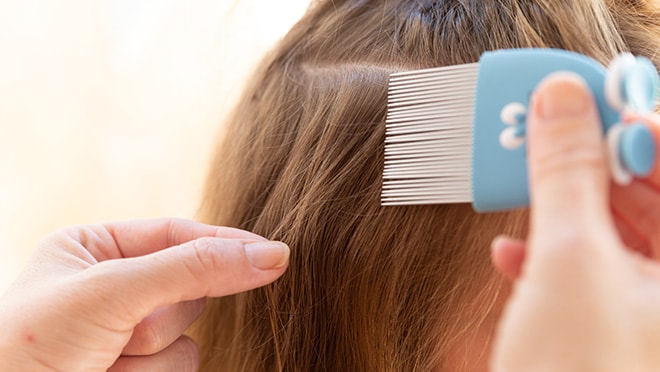Key points
- You can examine a person or child's head for head lice infestation.
- Either prescription or over-the-counter medications can treat head lice infestation.
- If a child has head lice, they do not need to leave school early. Once they start treatment at home, they can return to school.

First steps
If your child has symptoms of head lice infestation, examine their head, especially behind the ears and at the nape of the neck, for crawling lice and nits. If you find crawling lice or nits, examine all household members for head lice every 2 – 3 days. Treat anyone with live (crawling) lice or nits within ¼ inch or less of the scalp.
Head lice information for schools
CDC's guidance has not changed—you do not need to send students with head lice infestation home early from school. Students with lice can go home at the end of the day, be treated, and return to class after beginning appropriate treatment. Nits may stay in hair after treatment, but successful treatment will kill crawling lice.
Both the American Academy of Pediatrics (AAP) and the National Association of School Nurses (NASN) advocate to discontinue "no-nit" policies (a child being free of nits before returning to school) for the following reasons:
- Many nits are more than ¼ inch from the scalp and are unlikely to hatch to become crawling lice, or may in fact be empty shells (i.e., casings).
- Nits bond to hair shafts and are very unlikely to transfer to other people.
- Unnecessary days off cause a burden to the students, families, and communities, and far outweighs the risks associated with head lice.
- Misdiagnosis of nits is very common during nit checks conducted by nonmedical professionals.
Providing care
Follow and complete all treatment instructions and steps to successfully eliminate head lice.
CDC does not make recommendations on a specific product or products to use to treat individuals with lice. Both over-the-counter and prescription products are available. Contact your doctor, pharmacist, or health department for additional information about which product they recommend.
Reporting head lice
Most health departments do not require reporting of head lice infestation. However, it is useful to share information with school nurses, teachers, parents of classmates, and others about contact with head lice to limit spread.
